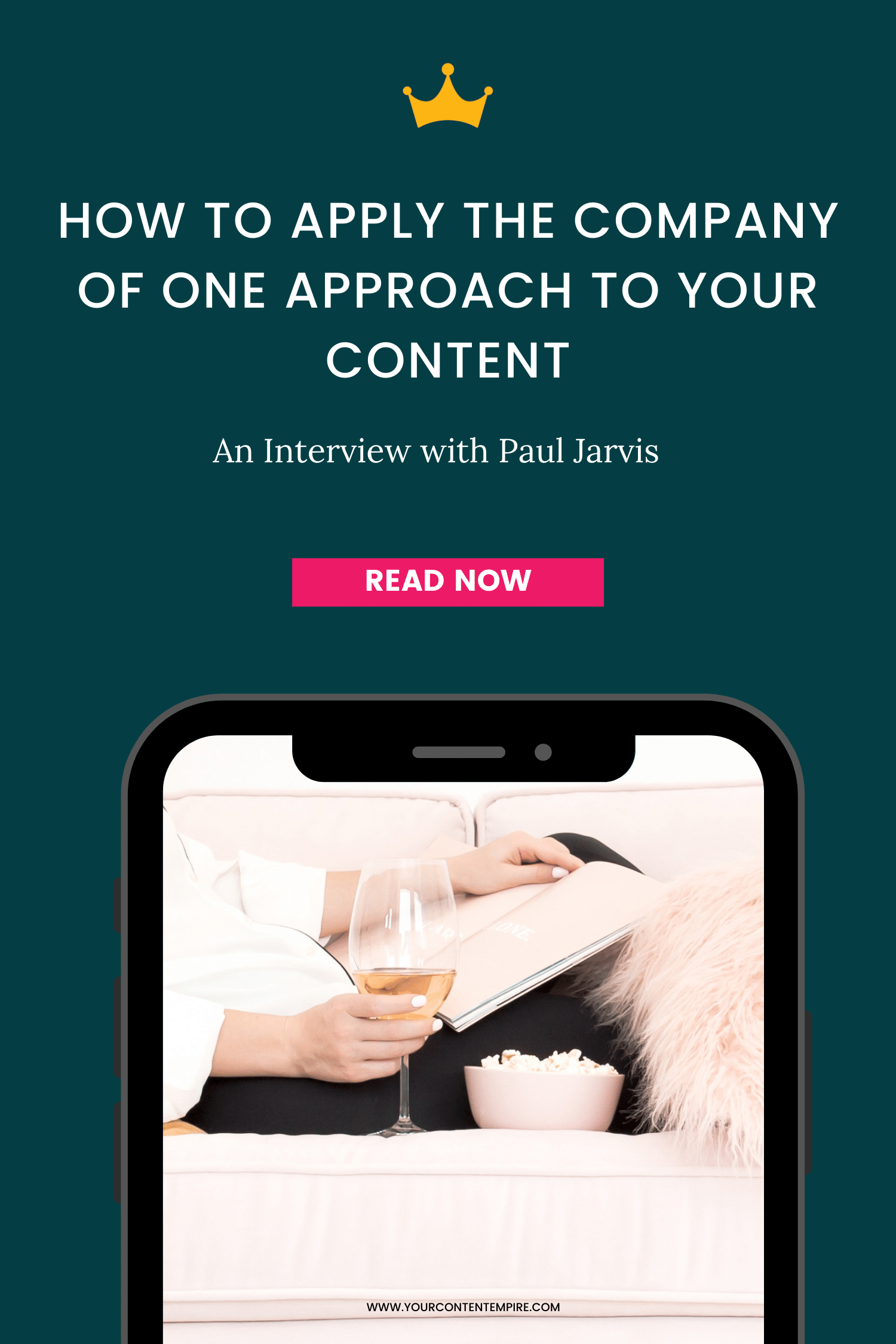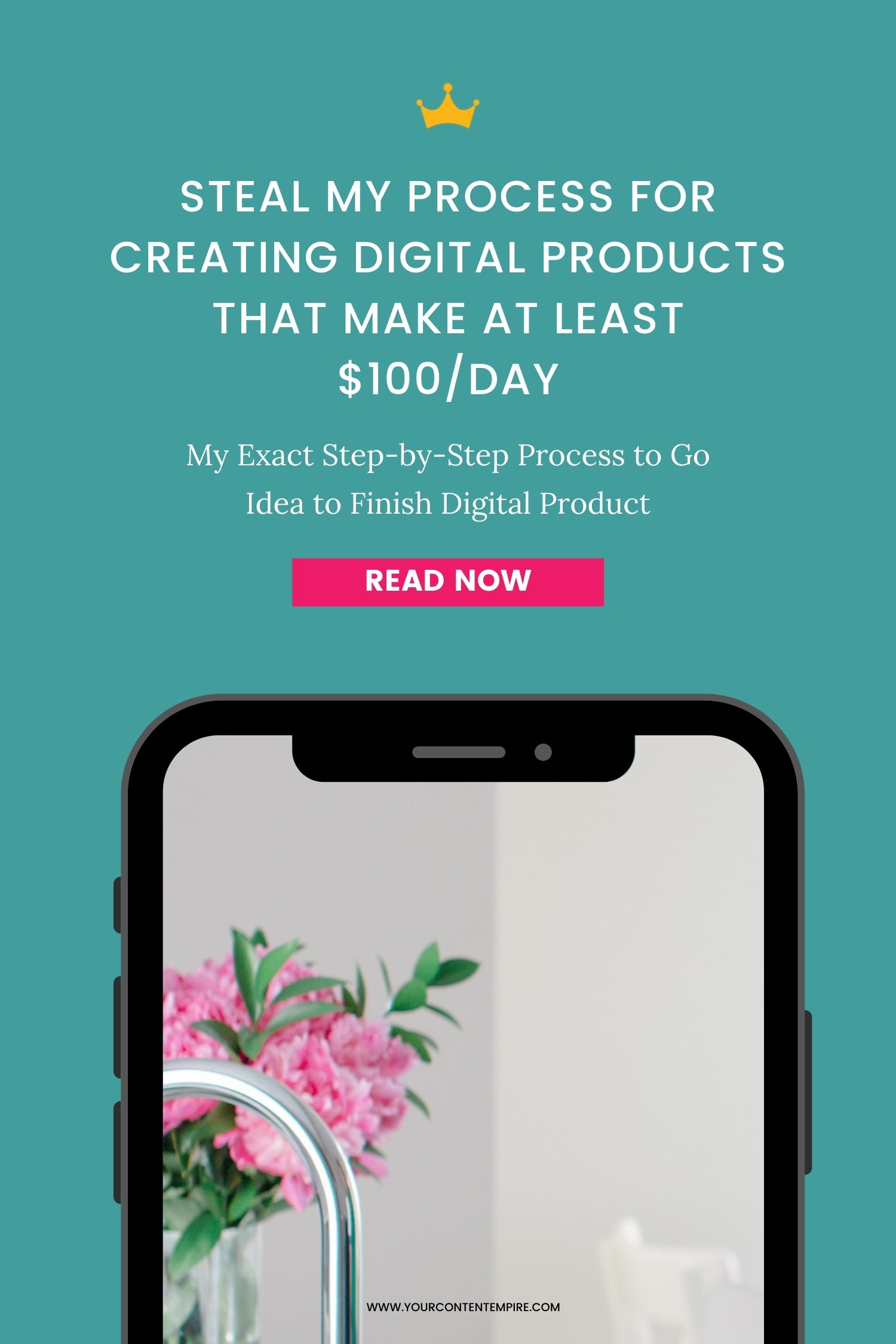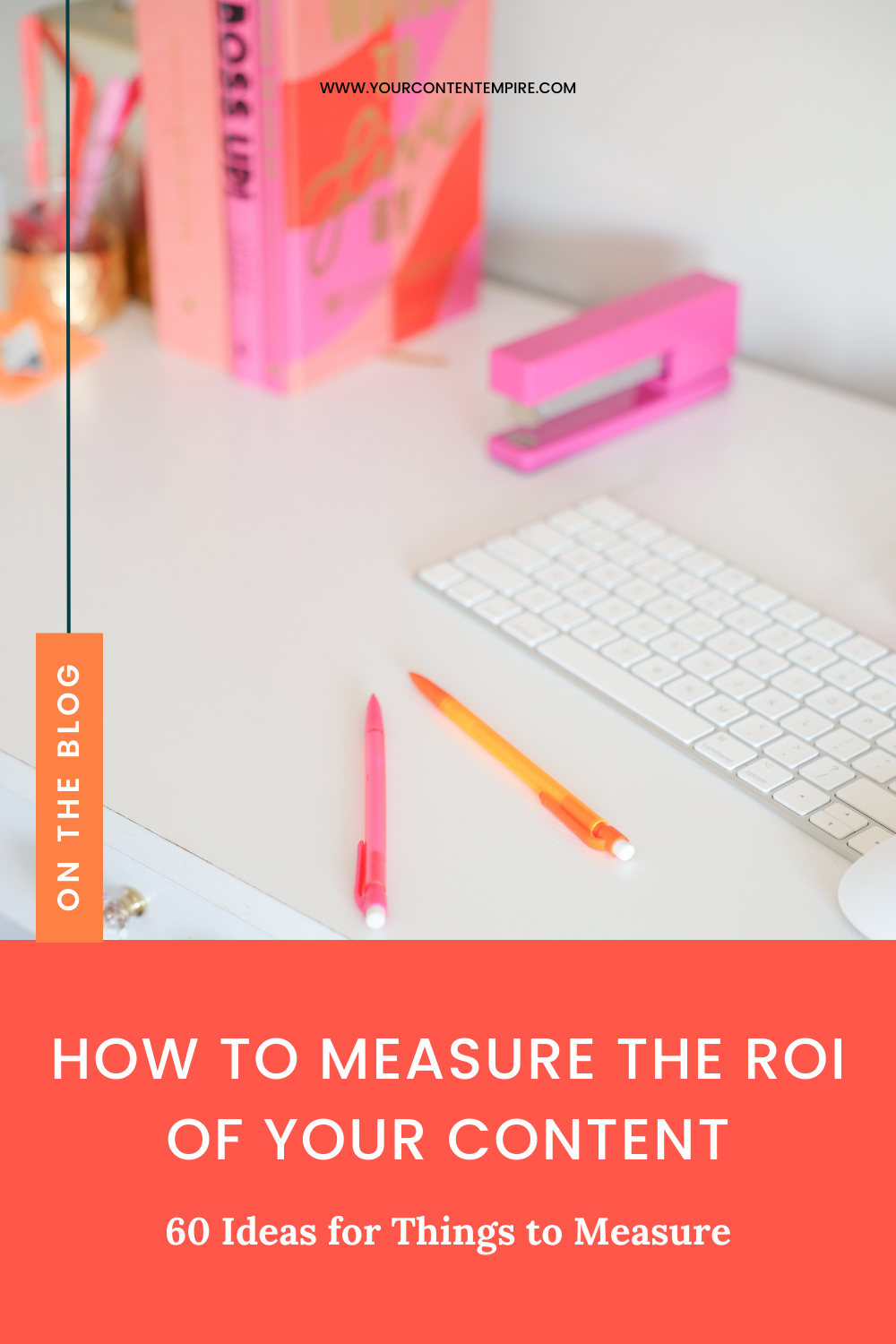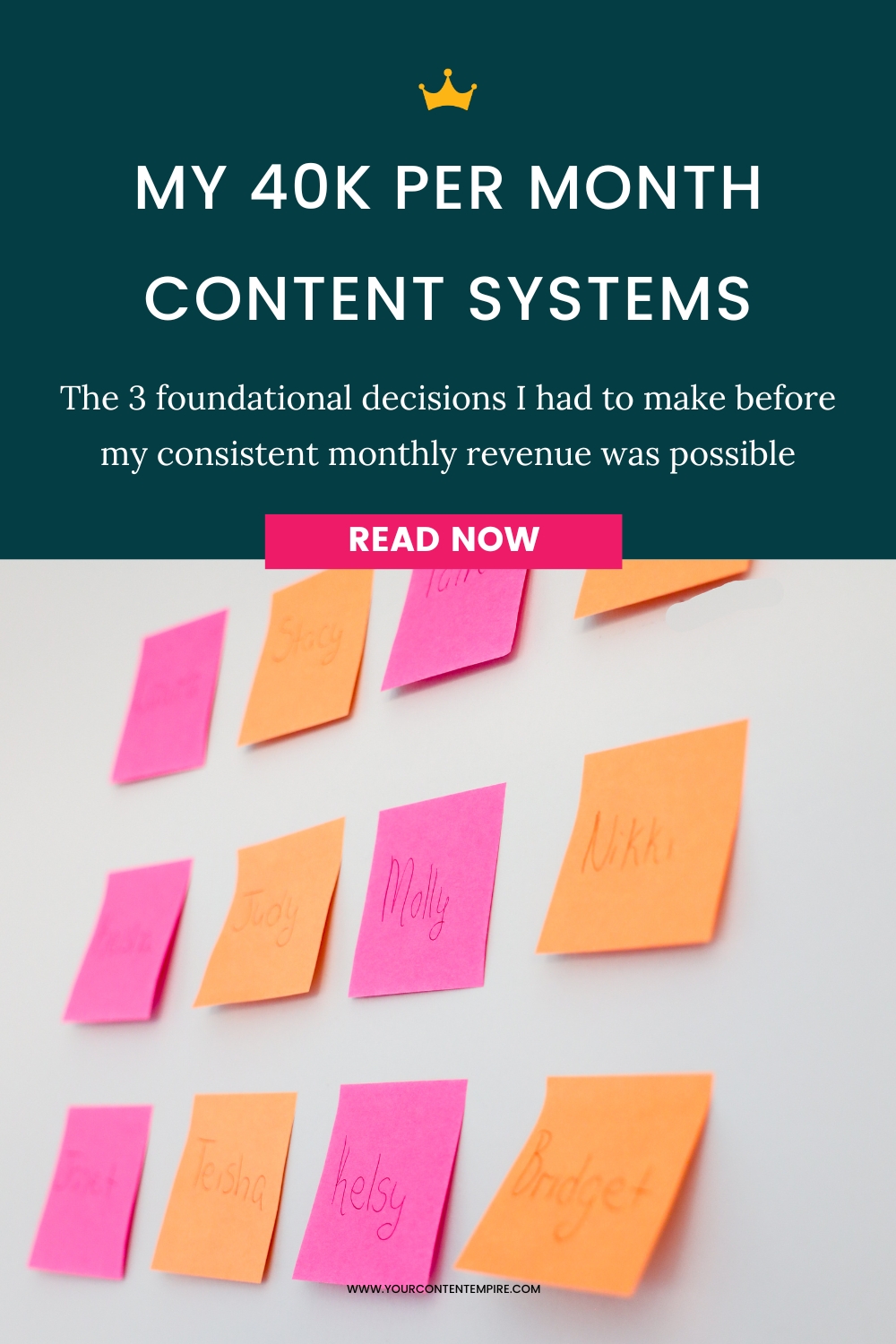Are you stuck in the should-cycle of more-more-more when it comes to content and marketing your business? Content overwhelm is the most common complaint I hear from my community – so if you can relate this episode where I interview Paul Jarvis, author of The Company of One is definitely a must-listen. We chat about how to apply the Company of One approach to your content and he shares a ton of behind-the-scenes tips on how content work in his own business!
Paul Jarvis is a writer and designer who’s had his own company of one for the last two decades. His latest book, Company of One, explores why bigger isn’t always better in business.
He’s worked with professional athletes like Steve Nash and Shaquille O’Neal, corporate giants like Microsoft and Mercedes-Benz, and entrepreneurs with online empires like Danielle LaPorte and Marie Forleo.
Currently he teaches popular online courses, hosts several podcasts and develops small but mighty software solutions.
Key Takeaways from this Episode
I'd love to just start with a little bit about your journey from when you first started out in design to where you are now and what your business is now.
- I started out as a designer at an agency. I loved the clients I was working with. I loved the projects. But I didn't love the agency. So I was like, “Okay, the problem is the agency, so I'll just go find another one to work at.” I didn't actually have any plans or ambitions to be an entrepreneur.
- So I quit that job and I was going to … And this is in the '90s. The internet only had like eight pages. None of them were about resumes. So I was going to go to the library to look up how to write a resume. The day after I quit, when I was going to do that, I started to get calls from the clients that I'd been working with and they were like, “Hey, we liked working with you more than we liked working with the rest of the agency, so where are you going to go work next and we'll just bring our business with you?”
- After I got a couple of those calls, I was like, “I guess I could probably just work for myself and work with these clients and be able to do the kind of work that I want and give the kind of quality that I want with them.” So it kind of started by accident. I think I went to the library instead to look up how to start a business because I was living in Toronto at the time, so I went to like how to start a business in Ontario. I was trying to find books on that instead. It was totally an accident. But that was 20 years ago. So it kind of stuck I guess.
And what are you doing now? You obviously eventually pivoted out of design into what you're doing now?
- Yeah. So I did client work for probably about 14 or 15 years and then I started to make digital products. I think I started with books, self-publish books, and those started to go really well. So I made a few courses. Then I started to notice like, “Hey, I'm actually making more money from my products than I am from my client work. What do I want to do here?” It was actually kind of difficult to juggle both. So I was like, “Well, I've done client work for quite a while. Maybe I should just try my hand at being a product person instead.” So yeah, I kind of shifted into that, and I've been doing that for I guess five or six years now. Now I do books and courses and podcasts and a couple software products.
Oh, I love that. I think the majority of my students that you are like living their dream. They're all stuck in service land and they want to get to that place where they can be doing courses and books. Did you always start off with the Company of One approach in mind with your own business, or were you ever tempted by the lure of the bigger is better myth?
- I think I was probably tempted. But for myself, I like doing the work. I don't like managing other people doing the work. I always felt like I didn't want to promote myself out of a job that I liked, like actually doing the design and the writing and all of that into a job I didn't like, which was managing people. I think that there's some people who are put on this planet to be managers and they're really good at that and they excel at that, and that's their core skill. I'm not one of those people. The reason I didn't grow my business, at least initially, was I just didn't want, I just didn't want to manage people. I don't like that. I don't want that responsibility. I don't feel like, yeah, I don't feel like that would be worth it for me to have to manage others.
What are some symptoms that business owners can use to start to distinguish and recognize if they're maybe chasing growth for growth's sake or truly following the trajectory of growth that's right for them?
- Yeah, I mean, I think it comes down to what you want. I think it's as basic, but obviously not simple to kind of think about why you started the business in the first place. I think for a lot of us it's freedom. We want the freedom to be able to make choices. I mean the book's thesis and what I really posit there is that I think the byproduct of business success isn't growth, it's freedom, and it's the freedom to choose. Maybe this type of growth makes sense for the business you're running, or more importantly, maybe this type of growth doesn't make sense for the type of business you're running. Because I think we all kind of get enamored by this, well, this quest to become “like legitimate business people.”
- When I think if you're running a business and is making money, you're a legitimate business person. Doesn't matter if you're in your underwear in a spare bedroom or kitchen table in your house. Like you're still … If you're making money, you're running a business. I think it doesn't make you more of a business person if you have an office and a staff and you're trying to grow your revenue month over month. I just think that's a track that some people might want. I don't even think is a bad track. I just think that is not the track for myself or for a lot of the people that I know or all the people that I spoke with when I was writing the book.
- Because I think that there's not just one way to have a business or run a business or do a business. I think that we should be, like if we're running the show, if we're the entrepreneur or the boss, then we should be able to make the decisions around, how do I want my business to look? What decisions can I make that will maximize this freedom that I started my business wanting more of?
But what about the business owners who find themselves stuck in that growth trap? Is it as easy as pivoting and turning around? Or what are some steps that they can start taking to unstick themselves?
- Yeah, I think it comes down to asking yourself questions like, how much is enough? How will you know when you reached it? Will anything change for the better if you do? Or even thinking about more pragmatically, like how would this growth actually serve or better my existing customer base? Or what are the maintenance costs or obligation debts of saying yes to this growth? Or even how does this growth affect my profit or my margins? Because sometimes you have to spend a lot more to make a little bit more.
- I think because no business is the same, I don't think there's any answers here in general. I think there is just, if we start to ask ourselves questions instead of thinking, “Well, this is just the way business works.” Well, there is no way that business just works. I think it's more a matter of how does business work for you? And I think if we can be a little introspective there and we can think about like, “Okay, well, what do I want,” instead of what looks good for other people or what looks good for my business buddies or whatever, it's like, “Well, what do I want? What do I want out of this business and what's going to give me that freedom?”
How do you recommend that somebody take the Company of One approach to content marketing in their businesses?
- Yeah. So I don't grow, I don't work at growing my mailing list, which … Well, so it just happens and it's not a priority. There's a few things at play that I can kind of break down there. The first is that I did need to grow it in the beginning because … And this is where I think a lot of people honestly get caught up on growth because in the beginning when you have no revenue, no customers, no mailing list subscribers, you do need growth. You 100% you need to grow from zero to something to sustainability to profitability. You need to grow in the beginning.
- So we get in our heads that, “Okay, well growth is great in the beginning.” I go from making $0 to $1,000 a month doing this thing. This is awesome. If we don't question that though, we never lose that mindset where it could grow past the point of what we actually want into something we don't want. And because we don't challenge that mindset, we're still in that phase of being hungry for more.
- The way that it relates to what I just said about my mailing list is in the beginning I did need to grow because my mailing list is what generates all of the revenue for my business. It's like more than 96% at this point. So my business runs, no matter whether it's courses or podcasts or software, it's all mailing list, it's all related to how I share with my mailing list.
- In the beginning I needed to grow it to a certain point. But once it hit a certain point, it was generating enough revenue and enough customers and enough everything for me where I didn't have to focus on growth anymore. I didn't have to focus on acquisition. I could then shift my focus to retention. So if my time wasn't spent focusing on, okay, where can I guest post or do interviews or do this or that or add popups or whatever you do to grow your mailing list these days, if I didn't have to focus on any of that, it freed up all of my time to focus on, okay, what are the people who are showing up want from me? What do they want to hear about? What do they want to know? What do they want me to share with them of value?
- In doing that, my audience stays happy hopefully for a long time, and they buy enough to support the life that I have, and I don't need to put all of this time and effort and energy into growth because it's reached a point where it's enough. I also noticed that there was a certain point where writing for other publications would net me quite a few subscribers more than my mailing list was just generating on its own. And it reached a point where writing guest posts no matter for what publication weren't doing as much as just people sharing the stuff that I was creating and writing with their own audiences.
- I think that the not focusing on growth is not really a stagnation where it's like you just, “Oh, I've reached enough, I'm going to stop and coast.” I don't think that's the case or the point. I think it's just a shift in priorities towards optimization where my mailing list does still grow. I don't put any work into it. But people still share it. People still tell others about it. So it gets written up in these weird list articles that I think nobody reads. So there's still things happening there and there's still some growth to offset the churn, because people, every time I sent out an email, I get a couple of hundred unsubscribes. That's just the way that email marketing works. So it's just a shift in priorities as opposed to stagnation or a coasting.
So when you turned your attention to retention versus growth with your email list, what were some of the things you were doing to really get in the heads of those subscribers who were showing up and to figure out what they wanted and deliver on that?
- A lot of listening. If I send out an email, I get a couple hundred replies. I just look for patterns in that. I think the job of a content person or a writer or whatever you want to call yourself is noticing things. The more that you can notice kind of the … Not even just what people are saying, but kind of what they're, like peeling the onion back a few layers. So if they say one thing, you can kind of see through an aggregate of data that they're really wanting something else, or they're really wanting something one step prior to that.
- A lot of my content comes from just listening to what people are saying, or looking at, okay, well if I sent this email out and got 150 replies and then I sent this email out on this topic and I got a thousand, people are probably more interested in the one that got a thousand replies versus a hundred. That's actually how I wrote Company of One.
- I wrote an article. I shared it with my mailing list. It got probably 10 times more replies than anything else I'd written that year. And it was just, it was a silly article about something like why I don't care about growth, and I was just trying to explain to my audience how I run my weird little business. I was just like, “I just want people to kind of understand how this works. They probably aren't going to want to do this for themselves, but just so they have a better understanding of how my business works.” And then I just got inundated with people being like, “Oh, I actually thought that I was the only one who didn't want to focus solely on growth.” And I was like, “Oh, there's more people out there that are kind of feeling this way.”
- Then that when I was pitching my agent, I was like, “This article got so many more replies than all my other work.” Like this, there's something here. And then when she was pitching it to publishers, same thing. It can just be used further and further down the line.
I love that idea of crowdsourcing what you should double down on. That was actually one of my questions, is what question or spark led you to write the book? I think that's so smart. If we use our content to respond to either an external question or demand or internal curiosity, we're never going to lack for inspiration and connecting that content to a purpose.
- Yeah. I wouldn't know how to just sit down with a blank page and start writing. Every article I write, every book I write, even every single product that I make is a result of listening to my audience and looking for trends and commonalities. I don't know how to make something and find an audience. I know how to find an audience and then listen and make stuff.
Oh, so smart. My audience, they tell me what they want. They love behind the scenes stuff. So can you walk us through what a typical content creation day looks like for you? What is your process for creating new content look like now?
- Yeah, so I have a document that I just basically, every time I notice something, I just kind of write it down in point form, and it's … Hold on a sec. I'll just open it and I'll tell you. It's probably a gazillion words long. Where is it? Yeah, it's currently, and I prune it all the time, it's 50, and this is in point form too. It's 5510. It's 55 … 5510 words long.
- Yeah. And 90% of it I'm probably not going to use, and every probably quarter I go through it and just cut all the things, I'm like, “Yeah, I'm not interested in that anymore,” or, “That, I've already written about that.” Or, “This is something that I thought was a trend, but it was just a blip when I thought it was something more.” So I just use that to write.
- Typically, if we're just talking about writing articles, all right, if I'm sitting down to write one article, I'm sitting down to write three or four because I always find that because writing's my job, I don't care if I'm inspired or not, I just, if it's a writing day, I have to just sit down and write. And I always find the first article is like pulling teeth, like writing really slow and I'm like, “Ah, this is really difficult.” But then after 10 minutes, I'm into it and I'm writing.
- And then I might as well, if I'm already, if I've already got myself into that kind of state, then I might as well write another one, because if the first one probably takes me about 40 minutes to do a crappy first draft, then second one will probably take me like 30, the third one will take me 20, and then 20 again. So I try to do that.
- I don't write every day. But I try to write for a full day once a week. And a full day for me is usually three or four hours because the other part of the day is admin stuff, which is still work, but I don't count it really as that. So if I can work three or four hours on writing a day, even if I'm writing a book, even if the only thing I'm doing at the time is finishing a draft for my publisher, still only probably about three or four hours a day, because the rest of the time there's so much other things to be done, it's got to be filled up with other stuff.
Yeah. I was going to ask you, how did you balance the demands of the ongoing content creation with writing a book? Did you add an extra day in your week for writing?
- I wouldn't add an extra day in my week for any work ever. I have really healthy boundaries about that from experience of not having healthy boundaries there. No. So what I did was I stopped my newsletter for three months. I stopped doing anything for three months other than writing the book. I didn't do any interviews. I didn't do any travel. I didn't work on … There was no software updates for any of the products that I had, didn't open any of my courses during that time. It was just I'm going to give myself three months to get this draft out the door and then go back to working on all of the other things.
- I actually kind of do that with everything to be honest. Like if I'm working on a course update, I don't do anything. If I'm working on what … the given software, I'll put like a week where it's just that thing and then I'll do other stuff after. I'm not really good at multitasking. I find that if I'm doing something, that the more I do it, the faster I get. So that's why I batch my writing. So yeah, I just try to do one thing at a time.
So how would you define a content empire as it relates to your business and the Company of One?
- Yeah, I think for me content is a good way to build relationships and trust. I always kind of think about content in a way that I would be, I feel like I'm really good at sales and marketing, but I'm only really good at sales and marketing in a specific way, and that's content. If you put me in a car dealership and said like, “That nice couple over there, Paul, go sell them a car,” I would be like … And I love cars. I'm a big car nut. I can tell them everything about the car. It would go horribly, horribly, horribly wrong.
- But how I feel about content and I guess a content empire is that I know how to write and I know how to tell stories. And even when I'm selling, I try to use story and I try to use all the things I know about writing to tell people like, “Hey, if you want this thing, if you get value from this thing, then this thing is available.” I don't know how to have hard sales pitches. I know how to explain things and tell stories about things. And that really works. That's actually how I really like to sell as well. So yeah, like I said, my content empire is my mailing list because my mailing list generates almost my entire revenue for my business regardless of what it is that I'm selling.
Yes. There are no shoulds in business, but if you were an online business, probably focusing on the email list is a smart idea.
- Yeah, I mean I've done that for seven years. I've sent out an email every, I mean it's called The Sunday Dispatches, which I named it purposefully because that forced me to send out an email every Sunday. I haven't missed a Sunday other than the breaks that I take twice a year for two months, I've never missed a Sunday. I think that consistency really shows my audience that I care about them because I really do. They kind of return that by giving the emails attention and reading them. I mean my open rate is far higher than industry average I think just because I spent so much time developing this consistent cadence with them and trying to share the information that they most want to read from me. So I think that it just becomes a reciprocal relationship at that point.
Lightning Round
Latest content or marketing tool discovery? I'm an old dog and don't learn new tricks. There's nothing n
Most profound business book you’ve read? Deep Work, Cal Newport, best book ever.
What is one marketing trend that you're passing on for now? Social media, Instagram, any trend. I'm not really good at those
2018 or 2019 planner of choice? My text editing program. I write everything. I don't have any software. I don't have any fancy software. I just write stuff in a text editor.
What are you intentionally investing into your business this year? More focus, like more of that mono tasking singular focus for a time. I do that, but I need to get better at it I think.
Links for this Show






